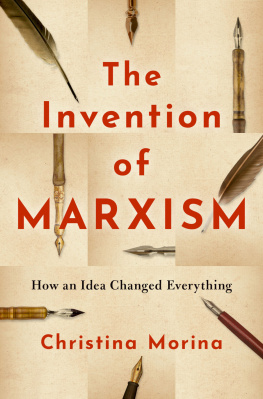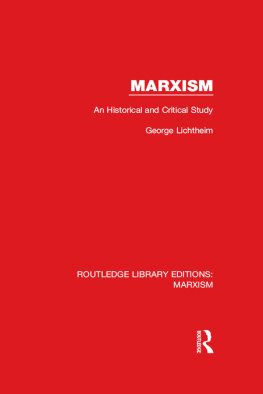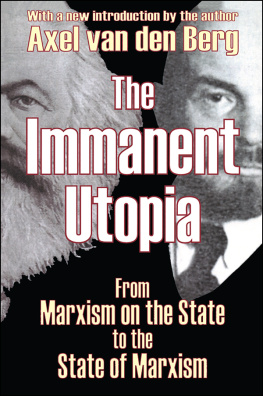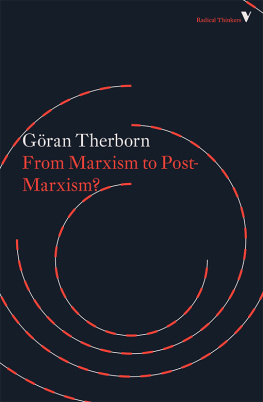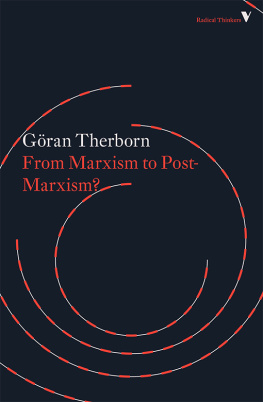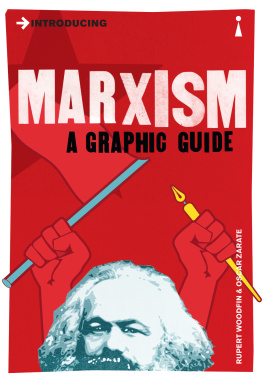understandingMarxism
Understanding Movements in Modern Thought
Series Editor: Jack Reynolds
This series provides short, accessible and lively introductions to the major schools, movements and traditions in philosophy and the history of ideas since the beginning of the Enlightenment. All books in the series are written for undergraduates meeting the subject for the first time.
Understanding Empiricism
Robert G. Meyers
Understanding Environmental Philosophy
Andrew Brennan & Y. S. Lo
Understanding Existentialism
Jack Reynolds
Understanding Feminism
Peta Bowden & Jane Mummery
Understanding German Idealism
Will Dudley
Understanding Hegelianism
Robert Sinnerbrink
Understanding Hermeneutics
Lawrence K. Schmidt
Understanding Marxism
Geoff Boucher
Understanding Naturalism
Jack Ritchie
Understanding Nietzscheanism
Ashley Woodward
Understanding Phenomenology
David R. Cerbone
Understanding Postcolonialism
Jane Hiddleston
Understanding Poststructuralism
James Williams
Understanding Psychoanalysis
Matthew Sharpe & Joanne Faulkner
Understanding Rationalism
Charlie Huenemann
Understanding Utilitarianism
Tim Mulgan
Understanding Virtue Ethics
Stan van Hooft
First published in 2012 by Acumen
Published 2014 by Routledge
2 Park Square, Milton Park, Abingdon, Oxon OX14 4RN
711 Third Avenue, New York, NY 10017, USA
Routledge is an imprint of the Taylor & Francis Group, an informa business
Geoff Boucher 2012
This book is copyright under the Berne Convention.
No reproduction without permission.
All rights reserved. No part of this book may be reprinted or reproduced or utilised in any form or by any electronic, mechanical, or other means, now known or hereafter invented, including photocopying and recording, or in any information storage or retrieval system, without permissionin writing from the publishers.
Notices
Practitioners and researchers must always rely on their own experience and knowledge in evaluating and using any information, methods, compounds, or experiments described herein. In using such information or methods they should be mindful of their own safety and the safety of others, including parties for whom they have a professional responsibility.
To the fullest extent of the law, neither the Publisher nor the authors, contributors, or editors, assume any liability for any injury and/or damage to persons or property as a matter of products liability, negligence or otherwise, or from any use or operation of any methods, products, instructions, or ideas contained in the material herein.
ISBN: 978-1-84465-520-5 (hardcover)
ISBN: 978-1-84465-521-2 (paperback)
British Library Cataloguing-in-Publication Data
A catalogue record for this book is available from the British Library.
Typeset in Minion Pro.
Contents
I wish to thank Deakin University for its grant under the Outside Studies Placement scheme, which made possible six months of research for this book. I also wish to thank the Department of Philosophy at Macquarie University for generously hosting me during this period. I could not have wished for better discussion partners than Nicholas Smith and Heikki Ikaheimo during this time; special thanks are due to Jean-Philippe Deranty, whose accurate political instincts on theoretical questions and committed materialism make him an ideal interlocutor, and to Robert Sinnerbrink, whose breadth of engagement with radical theory and voracious appetite for philosophical dialogue mean that no coffee break is ever wasted. Early drafts of some chapters of this book have appeared as background notes and occasional papers for the Melbourne Hegel Summer School, and some material from my The Charmed Circle of Ideology has been substantially reworked here. Dialogues with Jeff Sparrow and Matthew Sharpe have enabled me to clarify the positions expressed here in a multitude of ways. Jeremy Moss is another friend who has generously shared his knowledge of political philosophy; the remaining mistakes are obviously the result of my incorrigibility. Christine McMahon prepared the figures in the text, for which, thanks. Andy Blunden is, in addition to being a great friend, a wonderful interlocutor. He is also one of the editors of the Marxist Internet Archive: all hail the MIA! The work that has gone into its database is staggering, and I am personally deeply grateful to its editorial collective. What on earth did we do before that searchable archive? Frauke Hoffmann read arts of the manuscript and lived through much more; for her love and support, my astonished gratitude.
| MESW | Karl Marx & Friedrich Engels, Selected Works in One Volume (seventh edition) (Moscow: Progress Publishers, 1986). |
| MECW3 | Karl Marx & Friedrich Engels, Collected Works Volume 3 (of 50) (New York: International Publishers, 1976) (contains Economic and Philosophical Manuscripts of 1844). |
| MECW5 | Karl Marx & Friedrich Engels, Collected Works Volume 5 (of 50) (New York: International Publishers, 1976) (contains The German Ideology). |
| MECW6 | Karl Marx & Friedrich Engels, Collected Works Volume 6 (of 50) (New York: International Publishers, 1976) (contains The Poverty of Philosophy). |
| C13 | Karl Marx, Capital: A Critique of Political Economy in 3 volumes (Moscow: Foreign Languages Publishing House, 195961). |
| TSV13 | Karl Marx, Theories of Surplus Value in 3 volumes (Moscow: Progress Publishers, 196366). |
Today, radical thinking about social alternatives stands under prohibition. According to defenders of the neoliberal transformation of every facet of human existence into a market, Marxism has failed. The catastrophe of historical Communism the human rights abuses and totalitarian repression characteristic of the so-called socialist states of the former Soviet Union and contemporary China is adduced as the proof. Anything that goes beyond the advocacy of human rights, it is claimed, necessarily ends in disaster. Parliamentary democracy is the final horizon of good government; capitalism is the ultimate form of the just society; Marx is supposed to be directly responsible for the atrocities of Stalin and Mao; and Marxism, benevolent as it might seem, is said to result in totalitarian dictatorship. Anybody who dares to question this is promptly arraigned on charges of moral and political irresponsibility.
Not so long ago, a philosopher in the pay of a multinational think tank linked to the US State Department triumphantly announced that radical free-market capitalism was the end of history. Such voices have muted somewhat of late, in light of unprecedented financial crises and continuing foreign wars. They have had little to say in the face of the persistence of untold millions in the slums of this planet, whose quiet misery silently refutes the great lie of our time, that the market is the best and fairest way to deliver prosperity and justice to all. But the apologists for the status quo rise to a great crescendo whenever the unquiet ghost of Marx is invoked. Marx is dead; Marxism is finished and it must stay that way!
The aim of this book is to defy that prohibition on radical thinking about social alternatives. Marxism as an intellectual movement has been one of the most important and fertile contributions to twentieth-century thought. The influence of Marxism has been felt in every discipline in the social sciences and interpretive humanities, from philosophy, through sociology and history, to literature. The emancipatory social movements of the future will draw their inspiration from Marx, and Marxism, among others. This is because Marxism is a politics of mass struggle and popular mobilization in the name of a social alternative to the profit system, and this is likely to remain a feature of political life in the future.
Next page

